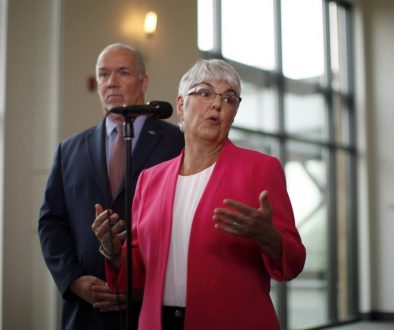‘Push’: How Big Finance Is Driving Up Housing Costs | The Tyee
Fredrik Gertten called his documentary — as in pushed out, you can’t live here. It’s a feeling familiar to many Vancouver residents.
Announcements, Events & more from Tyee and select partners
Your support for our ‘public-powered journalism’ is proving it can work.
The movie, shown as part of Kwantlen Polytechnic’s KDocsFF this week, follows the experiences of Leilani Farha, UN Special Rapporteur on the Right to Adequate Housing, in her quest to understand why more and more people around the world were being pushed out of homes they had long inhabited, and pushed out of cities where they’d long resided.
If the movie had a central message for Vancouverites, it is this: our problems are not unique, they are global. The “financialization” of housing is an out-of-control global pandemic, driven by the hunger of the financial management industry to find things to buy that will increase in value in a world where too much money is chasing too few assets — and where those assets are returning less and less profit as a result.
With bank interest rates approaching zero around the globe, and stocks already overvalued, the lonely eyes of money managers turn towards real estate and — voila! — they discover your apartment building.
Real estate investment trusts, for example, have been around in Canada since 1993. But the film explains that following the 2008 global financial crash, when real estate values plummeted, they swept in like vultures to feed on the wreckage.
These real estate investment trusts — and other similar investment vehicles — will take your savings and promise you an annual rate of return much higher than you could get in a term deposit or stocks. And the best part is you don’t have to know that your money was responsible for bouncing grandma out of her West End rental.
The business model for REITs and their counterparts is often to buy up “undervalued” rental properties. By undervalued, they mean buildings where existing rents are lower than the market will bear. Delivering higher returns for investors relies on getting rent-controlled tenants out of those apartments and offering them at much higher rates. Renovictions — evicting tenants based on the claim significant renovations are needed — is a favoured method. Once the rents have been raised, the owners can sell the asset at a hefty profit or manage it for steady financial returns.
What is most disturbing about this sort of vulture capitalism, the film makes clear, is that the machinery of financializing the asset, in this case housing, is not governed by what was once the connection of rents to local wages (typically 30 per cent of average wage) but rather to the “financialized” profit models of global asset managers. Thus, the local cohort of renters, inordinately the young just starting careers, are forced to give over a higher and higher proportion of their pay to the asset holders, the REITs.
This all hearkens back to a problem first identified by Henry George in the late 19th century, a topic I’ve written about before.
In an economic view long suppressed by so-called classical economists, but now being revived in the housing platforms of Bernie Sanders and Elizabeth Warren, George railed against the ways the rising value of land took a huge toll on society. Workers and business owners alike saw more and more of their incomes going to those who happened to control land (and passively reaped rewards as property values rose), he said.
His premise, now being borne out in Vancouver, was that unless something was done, more and more of the value of both labour (wages) and capital (factories, stores, machinery) would get absorbed into the value of urban land. There can be no surer proof of his hypothesis than Vancouver, where wages continue to stagnate as the price of land, and thus rents, skyrockets.
The film’s presentation was followed by a panel discussion with Vancouver Councillor Jean Swanson, former city councillor Ellen Woodsworth, Kari Michaels, executive vice-president of the BC Government and Service Employees Union, and Tom Davidoff, director of the UBC Centre for Urban Economics and Real Estate.
Swanson correctly maintained that a vacancy control law would constitute a crucial response to this crisis, because only through dampening the speculative method of asset valuations used by REITS could you slow the carnage. I agree. A vacancy control law ties rent increases to the unit rather than to the tenant, eliminating the incentive for eviction as a means to jack up rents beyond legal limits.
Faceoff: Two Experts on the Best Way to Address Vancouver’s Housing Crisis
Davidoff faulted the film for intellectual laziness in ignoring the influence of restricted housing supply on this problem. He cited the extensive lands in Vancouver zoned “RS” — formerly single-family, but now allowed to have up to four units per parcel (with as-yet no apparent benefit on rents or housing cost, sadly).
I was pleased by Michaels’ immediate and forceful pushback. Namely, that “the film could not have been more clear” that the problem was the financialization of the land asset divorced from local wages.
And there you have it, in a nutshell. The intractable debate without resolution for Vancouver.
Love the market. Hate the market.
Fire, ready, aim. ![]()
This content was originally published here.




